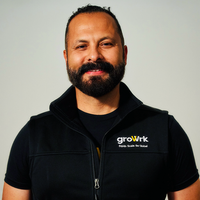Key Takeaways from HR Pulse: Insights into Remote Work Trends and Challenges

In our inaugural HR Pulse discussion, we delved into the evolving landscape of remote work, exploring the opportunities and challenges it presents. Here are the key takeaways from our conversation with industry leaders.

Antonio Javiniar
Antonio Javiniar is the Sr. Marketing Manager for Teamtailor in North America.
HR Pulse: Remote Hiring
-1200x630.png)
1. High Demand for Remote Jobs
Remote jobs are in high demand, and this trend is expected to continue. Many professionals seek remote work for its flexibility and work-life balance benefits. As Carlos Escutia (GroWrk) noted, "We don't see any slowdown whatsoever in terms of demand for remote positions."
2. Finding the Right Talent
The challenge for companies isn’t attracting candidates but finding the most qualified ones from a large applicant pool. Stacey Slater (Oyster) highlighted this by saying, "The challenges that we face as businesses and talent acquisition teams... is how we assess that talent. How we manage that application pool..."
3. Essential Skills for Remote Work
Assessing candidates for skills crucial to remote work, such as remote readiness, communication (both written and verbal), and time management, is essential. Sam Belazka (Bond Global) emphasized, "You need to find specific skill sets with people who work remotely... They need to be... excellent communicators..."
4. Defining Remote Work Clearly
It’s important for companies to clearly define what “remote” means to them in job descriptions and the application process. This includes specifying location and time zone requirements, as well as expectations around remote work policies and flexibility.
5. Global Trends in Remote Work
There is a global trend of companies offering remote work options and countries providing visas for remote workers. This opens up opportunities for hiring talent from a wider pool, enhancing diversity and inclusion in the workforce. Sam Belazka (Bond Global) remarked, "Really looking globally has really helped companies expand their workforce."
6. Communication and Expectation Management
Clear communication about remote work policies and expectations is crucial. This includes outlining company values, flexibility details, and what the remote work experience entails (such as asynchronous work and provided tools). Stacey Slater (Oyster) stated, "You have to be really intentional in the way that you go about creating that environment and how you communicate and work as an organization."
7. Employee Retention and Onboarding
Remote work can benefit employee retention by offering better work-life balance and attracting talent from a wider pool. However, companies need to ensure proper onboarding and engagement strategies to prevent employees from feeling isolated. Sam Belazka (Bond Global) highlighted, "I think remote work has done wonders for work-life balance and retention."
8. Building Trust
Building trust is essential for successful remote work. Companies need to trust their employees to be productive and deliver results without micromanagement. This trust forms the foundation of a positive remote work culture. Ben Rutter (Bond Global) shared, "We really rely on our value proposition and how we run that. Everything's built on trust."
9. Strong Leadership
Strong leadership is critical for managing remote teams. Leaders need to be intentional in building connections, fostering communication, and setting clear expectations to ensure team cohesion and productivity. Stacey Slater (Oyster) emphasized, "It doesn't happen without intent. You have to be considered, and you have to get things wrong, and you have to take on board feedback."
10. Supporting Remote Workers
Providing the right tools and resources is necessary to support remote workers. This includes communication platforms, project management tools, and well-documented processes to ensure everyone can perform their jobs effectively. Carlos Escutia (GroWrk) pointed out, "One of the key things that you miss when you're not in an office is the capability to get up and ask someone a question. Ensuring well-documented processes is crucial."
11. Hybrid Model Challenges
A poorly designed hybrid model can lead to the drawbacks of both remote and in-office work, with employees feeling disconnected and lacking the benefits of either option. Companies need to carefully plan and implement hybrid models to avoid these issues. Ben Rutter (Bond Global) noted, "You end up with none of the benefits of remote, and you end up with none of the benefits of in office, that hybrid blend."
12. Importance of Face-to-Face Interaction
Even in remote work environments, there’s value in occasional face-to-face interaction for team building, fostering relationships, and creating a stronger company culture.
13. Applicant Tracking Systems (ATS)
Challenges with ATS were addressed, with recruiters acknowledging that sometimes good candidates might be screened out due to reliance on filtering questions. Candidates are advised to carefully review job descriptions and tailor resumes and cover letters to highlight relevant skills and experiences.
14. Employer Branding and Candidate Experience
The importance of employer branding and candidate experience was highlighted. Companies should strive to create a positive experience for applicants throughout the recruitment process, enhancing their reputation and attracting top talent.
Looking Ahead!
Remote work is here to stay and will likely become more widely adopted. Companies are increasingly recognizing the benefits of remote work, such as access to a wider talent pool and improved work-life balance for employees. Hybrid models are also likely to be popular, allowing companies to maintain some benefits of in-person collaboration while offering flexibility to employees. The best work model for a company will depend on its specific needs and culture.
Our Esteemed Industry Leaders:

Stacey Slater, Senior Manager of Talent, Programs, and Operations at Oyster. Stacey has nearly a decade of experience in talent acquisition and she has successfully hired over 500 individuals across 70+ countries.

Carlos Escutia, Founder and CEO of GroWrk. Carlos is an expert in IT asset management for globally distributed companies. Before founding GroWrk, he co-founded CasaOne and served as an Investment Officer at FIS Venture Fund. Carlos has a wealth of experience in finance and operations!

Ben Rutter, Co-Founder and Managing Director of Bond Global. Ben is passionate about building world-class talent acquisition capabilities globally. He launched Bond Global in 2020, and his team has since helped build scale-ups across cleantech, deeptech, and biotech sectors.

Sam Belazka, Principal Talent Partner at Bond Global. Sam has over five years of experience in recruitment and talent management, specializing in engineering and cleantech environments. He works with startups to develop their talent attraction models and implement HR policies.
![]()
How to Enhance Your School Employer Brand with a Powerful EVP: A Guide from Teamtailor and Rhodes Branding
Your EVP is a fundamental element of a job seeker's journey, influencing their decision to join and stay with your district.
![]()
The Importance of soft skills in the age of AI
While technology plays a pivotal role in our lives today, we cannot underestimate the value of soft skills, especially during recruitment.
![]()
How to measure your candidate experience
37% of HR professionals said that candidate experience was their main measure of success. But how do you actually measure candidate experience?


